On November 16, 2022, two research institutes within Recruit Group, Indeed Hiring Lab and Glassdoor Economic Research, released their first joint report, "Hiring and Workplace Trends Report 2023." This blog explores the five labor market trends highlighted in the report that will impact the future of work with comments from Svenja Gudell, Chief Economist at Indeed, and Aaron Terrazas, Chief Economist of Glassdoor.
Five Multi-Country Trends Based on Hard Data
The Indeed Hiring Lab is an economics research team of economists and data scientists at Indeed, the world’s leading jobsite*1 and a leading global hiring platform. For the first time, Indeed Hiring Lab partnered with Glassdoor Economic Research at Indeed’s sister company, Glassdoor, to produce a joint data-driven, multi-country labor market trends report. This report explores multifaceted worker perspectives by integrating jobseeker data from Glassdoor, the worldwide leader on insights about jobs and companies. Here are the five key labor market trends for the coming years, highlighted in the report:
*1 Comscore, Total Visits, February 2022
#1: Tight Labor Supply Will Continue to Impact Hiring
”Employers are gaining back bargaining power from employees? In most industrialized countries, we don’t really think so. Pre-existing trends sped up, that is the demographic trends, due to the pandemic.” said Svenja. Many industrialized countries, especially Japan, China, Germany, and the United States, are aging, and the working population is expected to continue to decline. Japan is a notable example where the population, which was 128 million in 2010, is expected to fall below 100 million by 2050, and the proportion of those aged 65 and over is expected to grow significantly*2. In Germany, data shows that the working population aged 15 to 65 will decline by 7.2% between 2026 and 2036. The tight labor market is expected to continue in the future; companies will find it difficult to hire workers as the number of jobseekers in the workforce declines.
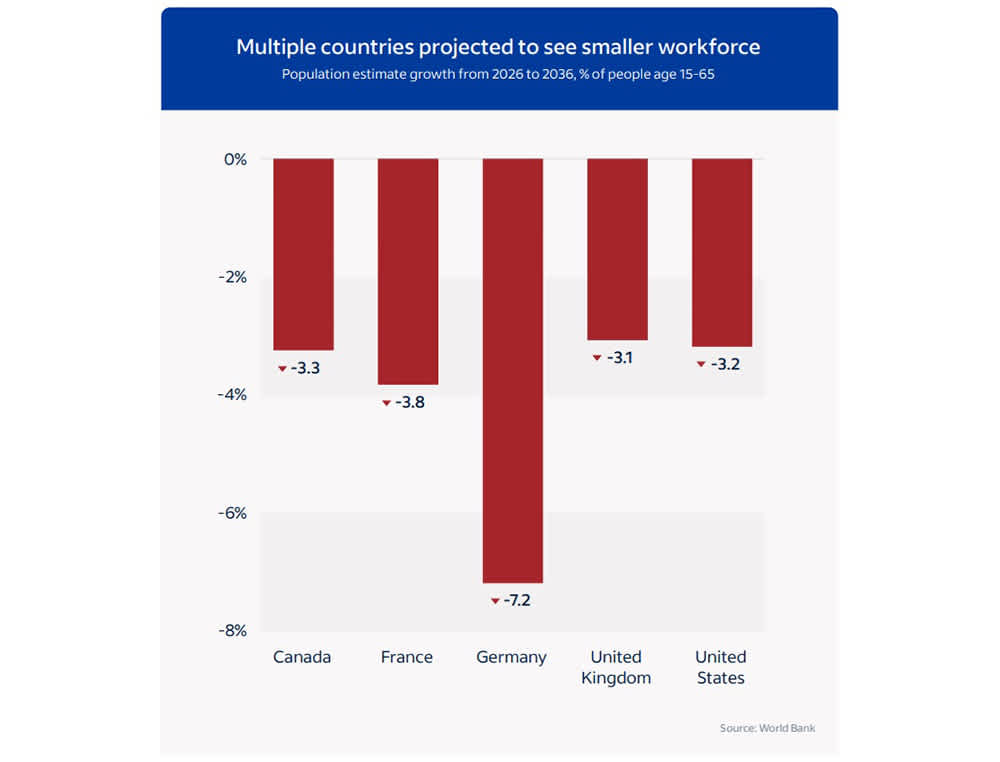
*2 Source: “Aging Society White Paper 2013” from Cabinet Office, Government of Japan (only in Japanese)
#2: Remote Work is Here to Stay
As of September 2022, remote work positions accounted for around 10% of job openings in many developed countries, up substantially from around 3% in September 2019. This trend is expected to continue in the future, which will have a significant impact on in-office roles. As many professionals shift to remote work jobs, it could become more difficult to fill vacancies for jobs that require a commute. According to a survey of employed U.S. job seekers aged 25 to 54, 16% of women are looking for a new job that offers remote flexibility, while only 11% of men said the same*3. Remote work could intensify economic inequality and gender roles (women seek remote jobs at higher rates than men) although remote work has some advantages.
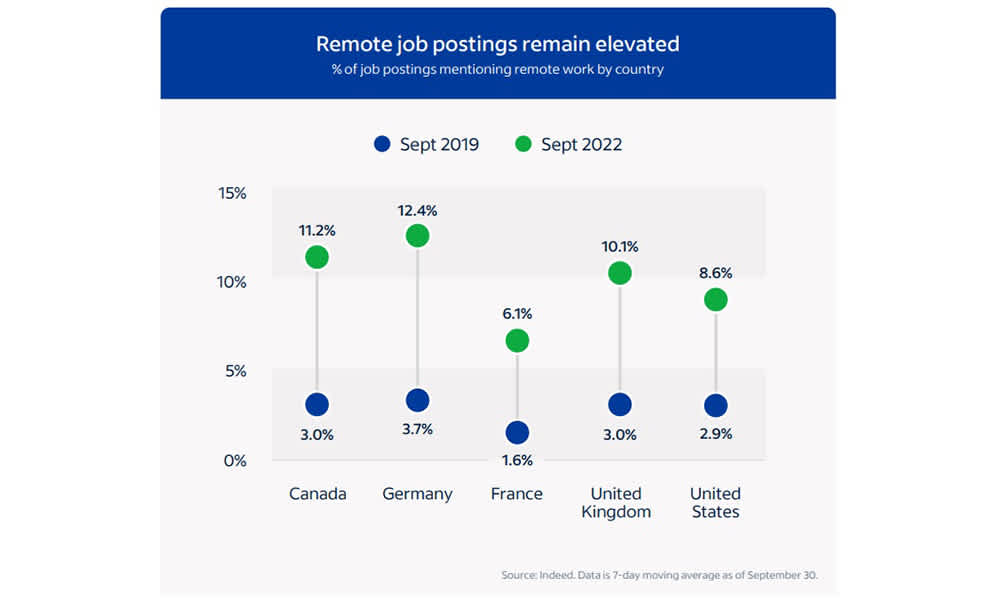
*3 Source: Indeed Hiring Lab Job Search Survey (Data from July 2021 to February 2022)
#3: As Workers Seek Higher Pay, Benefits Can Set Employers Apart
Jobseekers’ hourly wage parameters on Indeed search are increasing. In the U.S., throughout 2019 and much of 2020, the share of searches mentioning “$15” was greater than those mentioning “$20”. But that trend reversed in April 2021. Since then, the share of $20-related searches has outpaced searches mentioning $15*4.
On the other hand, an increasing number of companies are advertising benefits in their job offers and appeals to job seekers. Notably, lower wage jobs that pay less than $15 an hour have seen the fastest growth in advertisement of benefits including paid time off, retirement plans and healthcare. From August 2019 to August 2022, for instance, in low-wage sectors like personal care and home health, advertisement of paid time off rose from 21.3% to 38.8%. “Although this isn’t typical, employers are playing catch-up to attract talent, so offering benefits became part of the offer package,” Svenja said. Glassdoor data also shows that mental health-related benefits are on the rise across industries.
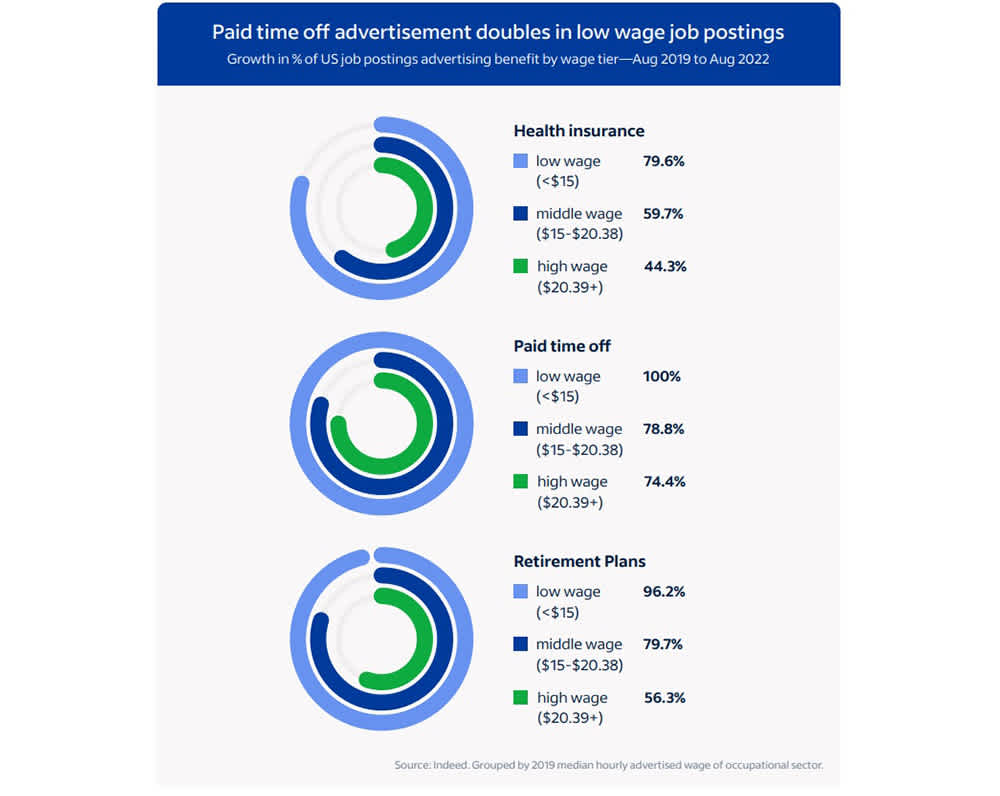
#4: Happiness and Well-Being Matter
A good salary and benefits are important, but they are not enough for current jobseekers. According to a survey by Indeed, 46% of people said that their “expectation around happiness at work has increased” in 2021, and 86% believed “stress at work can significantly decrease quality of life.”*5
In addition, Indeed data shows that the following three factors will become even more important in the future: being energized by work, belonging and trusting coworkers and employers for support (or psychological safety at work). Corporate culture will be an important factor in differentiating companies to jobseekers.
Not surprisingly, Glassdoor's data also shows that the more satisfied people are at work, the less likely they are to consider a career change.
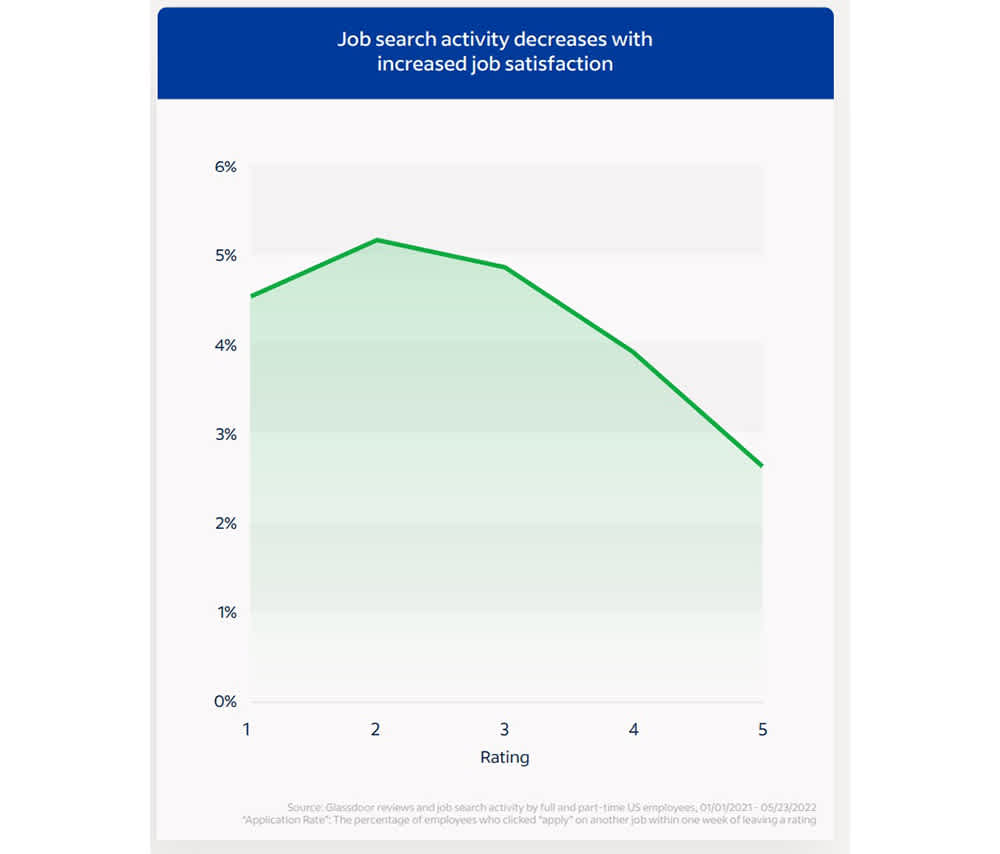
*5 Source: Indeed “Work Wellbeing 2022 Insights Report”
#5: The Changing Workforce Pushes Diversity, Equity, and Inclusion (DEI) to the Forefront
It turns out that age has an overwhelming impact on how much DEI is valued in the workplace, more than attributes such as gender, race, location, or parenting status, and there is a large gap between generations*6. In the 18-34 age group, about 70% of workers said that they would consider leaving their company if their workplace had no management support for DEI initiatives compared to 45% of workers in the 65+ age group agreed. It's a similar story with a lack of gender or racial diversity in leadership: younger workers were more likely to turn down a job for these reasons than older workers. Svenja said, “These younger workers are the future of our workforce. So, these things really, really, really matter.” She also added, “It’s important to work on DEI because employers want to retain employees and provide a positive work environment. But it is also really important for employers themselves, and it’s great for society as a whole.”
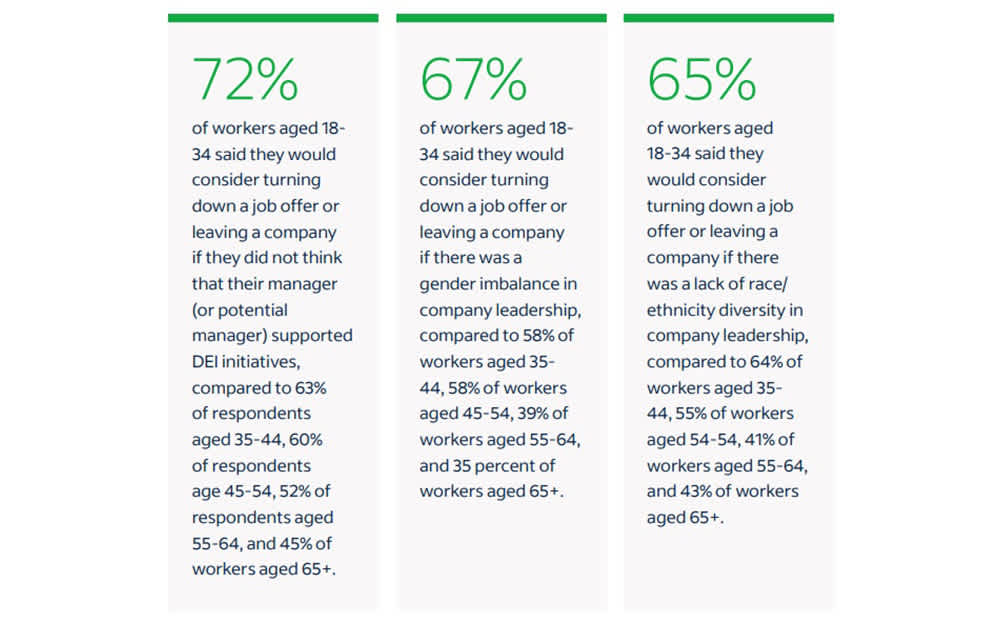
*6 Source: A September 2022 survey from Indeed & Glassdoor
Hiring Talent Will Remain Challenging in Several Countries for Years to Come
“COVID-19 deeply impacted the way we work,” said Svenja. “What is critical for leaders to understand is that these changes and shifts are not temporary. There will be no return to ‘normal’ that many seem to be awaiting.” “The five trends we have identified explore the labor market of tomorrow and what a new normal will look like. These trends are driven by hard data, both within our organizations and beyond. Together, they paint a clear picture: looking past any near-term business cycle shifts, hiring will remain challenging for years to come driven by demographics and evolving preferences.”
While no one can know exactly what will happen with the labor market, these five trends clearly show that attracting, hiring, and retaining workers will remain challenging for employers for the foreseeable future. As employers continue to grapple with an aging and more competitive workforce, they must be innovative about where to find workers and how to set themselves apart.
Aaron added “The past two years have pushed people leaders to the forefront of their organizations as executive teams around the world grapple with how to motivate and retain teams in a quickly-changing and increasingly volatile world of work,” said Aaron Terrazas, Glassdoor Chief Economist. “Rising to the challenges of tomorrow’s workplace requires a more anchored approach to understanding the full range of employees’ wants and needs.”

Svenja Gudell
Chief Economist, Indeed
Svenja oversees the Indeed Hiring Lab–an economics research team of economists and data scientists leading the global labor market conversation. She joined Indeed as Chief Economist in January 2022 after exploring and explaining the real estate market as Chief Economist at Zillow for 10 years.

Aaron Terrazas
Chief Economist, Glassdoor
He joined Glassdoor in June 2022 to oversee the Glassdoor Economic Research program. Previously, Aaron served as the director of economic research at the trucking startup Convoy, and served in a similar role at the real estate marketplace Zillow. He started his career as an economist in 2012, supporting the work of the Deputy Assistant Secretary for Macroeconomic Analysis at the United States Treasury Department, and also worked as an analyst on immigration and labor markets at the the non-partisan Migration Policy Institute.